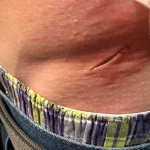Why Does Tetanus Shots Hurt?

What Is the Tetanus Vaccine?
The tetanus vaccine is part of the recommended series of childhood and adult immunizations. It protects against the bacterial infection tetanus, also known as lockjaw.
Tetanus causes painful muscle spasms and can lead to death. The tetanus vaccine has made tetanus a preventable disease. Thanks to its widespread use, lockjaw has become very rare in the U.S. Even so, adults need to be vaccinated against it. There’s no cure and 10% to 20% of people who have it die.
You can’t get tetanus from another person. You can get it through a cut or other wound. Tetanus bacteria are common in soil, dust, and manure. The tetanus bacteria can infect a person even through a tiny scratch. But you’re more likely to get tetanus through deep punctures from wounds created by nails or knives. The bacteria travel via blood or nerves to the central nervous system.
People of all ages can get tetanus but the disease is particularly common and serious in newborn babies and their mothers when the mothers` are unprotected from tetanus by the vaccine, tetanus toxoid. Tetanus occurring during pregnancy or within 6 weeks of the end of pregnancy is called “maternal tetanus”, while tetanus occurring within the first 28 days of life is called “neonatal tetanus”.
The disease remains an important public health problem in many parts of the world, but especially in low-income countries or districts, where immunization coverage is low and unclean birth practices are common. WHO estimates that in 2018 (the latest year for which estimates are available), 25,000 newborns died from neonatal tetanus, an 88% reduction from the situation in 2000.
How is the tetanus vaccine made?
The bacteria that causes tetanus makes a harmful protein, called a toxin. The name of the tetanus toxin is tetanospasmin. People who develop an immune response to this toxin are protected against tetanus. The tetanus vaccine is made by taking the tetanus toxin and inactivating it with a chemical. The inactivated toxin is called a “toxoid.” Once injected, the toxoid elicits an immune response against the toxin, but, unlike the toxin, it doesn’t cause disease.
This process requires multiple dosages to achieve a high immune response; however, it bears mentioning that there is no chance for the toxoid to exhibit its pathogenic features as it is an inactivated vaccine.
Why Tetanus shots are important?
A tetanus shot protects you from getting tetanus. Tetanus infections most commonly happen when you suffer a wound that gives the bacteria a chance to enter your body. For example, stepping on a nail is a common cause of tetanus infections. Once inside your body, the bacteria release a toxin that causes your muscles to tighten. This can cause your mouth to “lock” shut and make it hard to swallow. If not treated promptly, the muscle stiffness spreads and, in some cases, can cause death.
Tetanus is now rare in the United States, in large part because of vaccinations and improved wound care. People who work with soil, sewage, or animals are more likely to be exposed to Clostridium tetani bacteria in the event of an injury. In the United States, tetanus infections are more likely to be fatal in people over the age of 65 and people with diabetes, but they are serious in all individuals.
The World Health Organization recommends receiving the primary series of tetanus vaccinations during adolescence. Due to the requirement for primary immunization, an absorbed form containing multiple antigens is usually utilized. Children must complete the 5-dose DTaP (diphtheria, tetanus, acellular pertussis) vaccination series before the age of 7.
The CDC recommends the first dose at two months old, the second dose at three months old, the third dose at four months old, the fourth dose between months 15 and 18, and the fifth dose between the ages of 4 and 6. Following the first series of vaccinations, the recommendation is that adults receive boosters with Tdap (same components as DTaP, but reduced doses of diphtheria and pertussis) every ten years. Studies indicate that the Tdap booster given ten years after the initial series of vaccines is usually well-tolerated and effectively immunogenic.
Why do tetanus shots hurt so bad?
Any vaccine with tetanus toxoid as a component has the potential to cause brachial neuritis. Also known as neuralgic amyotrophy. Symptoms of brachial neuritis include; severe pain in the upper arm or shoulder. The pain usually affects just one side of the body. After a few hours or days, the pain transitions to weakness, limpness, or paralysis in the muscles of the affected arm or shoulder. Brachial neuritis is an immune-mediated inflammatory process involving peripheral nerves.
The tetanus vaccine can also cause low-grade fever and in rare cases severe allergic reactions. It is estimated that this allergic reaction could occur in about one of every 1 million children who receive the tetanus vaccine, and could include hives, difficulty breathing, or lower blood pressure. The allergic reaction can be treated with medications.
How long does Tetanus shot pain last?
Generally, pain at the injection occurs in 2 in 3 adults that receive the Tdap vaccine and should subside in a few days. In many cases, brachial neuritis will also resolve on its own after a few days. The best thing you can do is be patient, and follow the instructions of your healthcare provider to manage the pain of brachial neuritis and other side effects if present.





